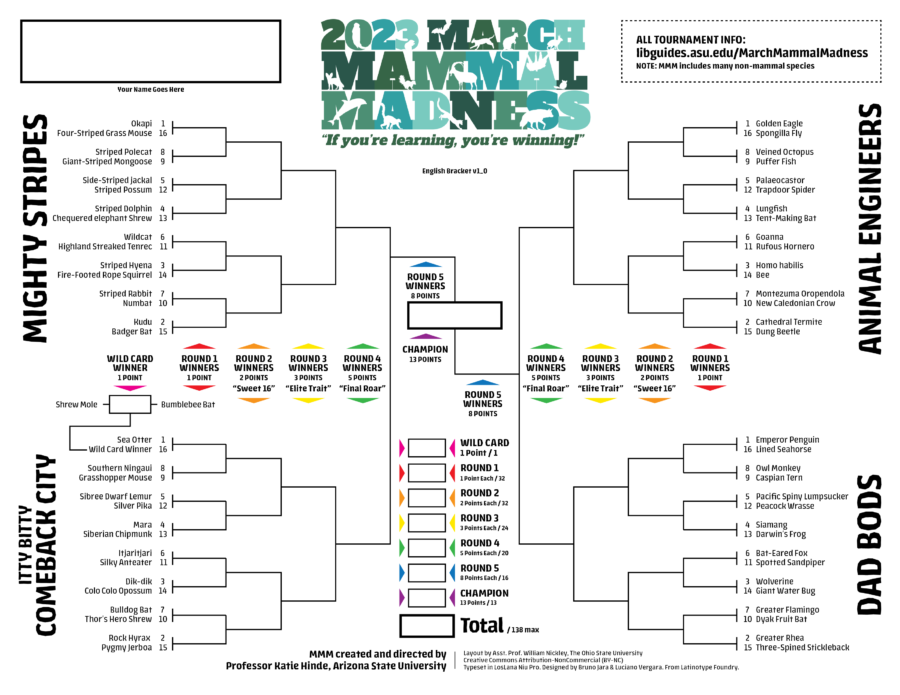How Classes at Berkley are Celebrating March Madness
Here at Berkley, many students and staff take March Madness very seriously. Who doesn’t love making brackets and predicting winners? Since people love March Madness so much, some of our own teachers have found or made variations of the event that relate to their classes.
First, Mrs. Ford, who teaches AP Literature, created her own brackets for a poetry version of March Madness. She explains how she discovered this idea: “I follow a lot of English teachers on social media,” and continues to say, “this woman I really like came up with the idea of March Madness Poetry.” To set up the bracket, sixteen poems are selected. Every day, two of the poems are selected to compete. Videos are played of the poems being performed, and students vote on which one they like more. The winners are recorded on a bracket, one for each hour. This process repeats until there is a clear winner. Mrs. Ford says while explaining how she chooses the poems to include, “the English teacher who made the bracket put her own poem selections into the bracket, so I use some of her selections and some of my personal favorites.” There is a wide selection of poetry being read on YouTube, so Mrs. Ford has a fun time picking the videos.
So why did she decide to do March Madness Poetry? She responds, “I wanted to build in some time before the AP exam where students could just enjoy poetry. I personally love reading poetry on my own time, and when I read it for fun, I never analyze it,” Mrs. Ford adds, “I am using March Madness Poetry as a way to allow students to experience poetry and enjoy poetry without [their teacher] sucking the joy out of it– which I am pretty good at!” She also explains how she believes that many of her students enjoy doing this activity in class because they “are all relieved to have a break from poetry analysis. But also, there is something awesome about watching a poet perform. The whole thing comes alive in a way that doesn’t always happen on the page.” Ms. Ford hopes that students who haven’t liked poetry all year long will, after participating in March Madness Poetry, actually enjoy at least one poem from start to finish.
The second variation of March Madness is being run by Ms. Nixon, AP, and a regular Biology teacher. The event that Ms. Nixon and her students are participating in is called March Mammal Madness (MMM). This is actually not created by Ms. Nixon herself. This event is run by Arizona State University. 64 animals (not all mammals) are chosen to compete and are given seed numbers. The winner of each round isn’t chosen by which animal would win in a fight but by traits that the species have and their ability to survive in the wild.
Ms. Nixon explains how she gets her students to participate in MMM: “I provided brackets to all the students, and I showed them all the fun parts of the tournament: learning about the other animals, listening to the Spotify playlist, watching the fun videos, and getting into the competitive spirit!” In her classroom, she has made a huge poster to fill in the winners. Each participant gets points for each round based on how many predictions were right and whoever has the most points, in the end, will win a trophy made by Ms. Nixon herself! She has been doing this on her own since 2013 when it originated, but this is her first year having her students participate as well. When asked if her students are enthusiastic about MMM, Ms. Nixon says, “they seem to be! Some students are really getting into the spirit of it, they want to be the winner to get the trophy!”
As you can see, many teachers are very excited about March Madness this year and encouraging their students to participate in their own ways. I hope to see more of this in future years to come!

Hey guys! My name’s Lucy Cohen, and I am so excited to have the honor of being the Editor-in-chief of The Spectator. This is my 4th and, sadly, final...







